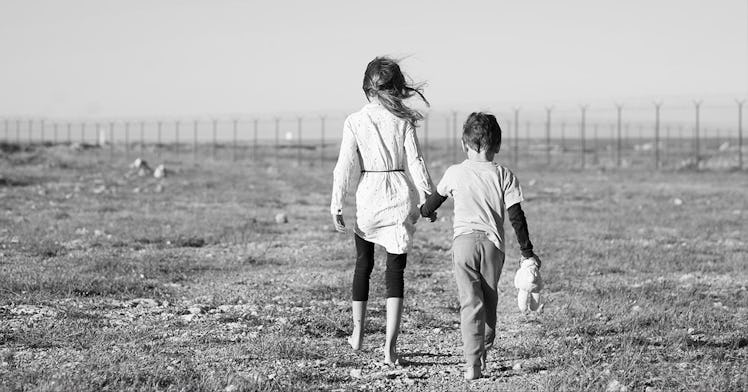Democratic Plan to Provide 8 Million Green Cards Rejected
Abiding by the non-biding ruling means 8 million undocumented people will likely continue to live with fear of deportation. But it doesn't have to be that way.

The Senate Parliamentarian just threw a wrench into President Biden and the Democratic Senate’s reconciliation package. Again. This time, it’s not a desperately needed minimum wage hike but desperately needed immigration reform that her opinion—and Democratic acquiescence to it—seems doomed to fail.
Here’s what you need to know about what happened in the Senate and what’s likely going to happen next.
What were Democrats trying to pass?
The immigration reform measures proposed by Democratic senators would grant legal status to undocumented people brought to the United States as children (Dreamers), those with Temporary Protected Status (a humanitarian designation), nearly a million farmworkers, and millions more “essential workers.” That adds up to protection for 8 million people who contribute to the American economy and society, and who don’t deserve to be deported. They would have had to pass background checks, undergo health examinations, and submit a $1,500 fee. That’s not exactly a free-for-all.
Foreign-born adults are employed at a higher rate than native Americans, and they work in vital industries like farming and food manufacturing, according to a report by the Center of Budget and Policy Priorities. Allowing them to stay in the country would encourage those contributions. It would also be the right thing to do.
Why did the measure to give legal status to 8 million undocumented people get rejected?
Parliamentarian Elizabeth MacDonough ruled that the immigration reform measures Democrats intended to include in its bill were “not appropriate for inclusion in reconciliation” because “[t]he policy changes of this proposal far outweigh the budgetary impact scored to it.”
The budget reconciliation process follows the Byrd Rule, a section of the Congressional Budget Act that outlines a six-point test for matters to be considered “extraneous” and therefore ineligible for inclusion in reconciliation, the so-called “fast track” that allows the Senate to pass laws relevant to the federal budget with a simple majority, effectively bypassing the filibuster in the process.
The ultimate authority on what is and isn’t “extraneous” belongs with the presiding officer of the Senate, in this case, Vice President Kamala Harris.
Leading Democrats have already signaled that they plan to submit a revised proposal for the parliamentarian’s approval. While it’s not yet been publicly released, it will likely do less for undocumented people and therefore have less of a positive effect on the country at large in order to gain the Parliamentarian’s stamp of approval.
What are the other options for helping these people gain citizenship?
Harris could simply ignore the Parliamentarian’s ruling and say that the immigration changes can stay in the reconciliation package. Or Senate Democrats could fire the parliamentarian and install a new person who chooses to define “extraneous matter” in a way that is more amenable to their policy aims, as the Republican Party did in 2001.
A united bloc of Democratic senators could also abolish the filibuster, negating the need for budget reconciliation, and pass a slew of progressive policies with their control of the presidency and both house of Congress, control that will almost certainly end with the 2022 midterm elections.
That the party can’t even stand up to someone who, by definition, has no real power means there’s little hope of this even more dramatic and impactful change happening anytime soon. And in the absence of this kind of progress, it becomes even harder for Democrats to convince people to show up to the polls, much less vote for a party that has demonstrated over and over again that it puts the norms and traditions of a dysfunctional legislative body over the needs of vulnerable people.